TRENDING
Airport Tips Every Traveler Should Know
Published
3 years agoon
Airports are bustling hubs, filled with travelers striving to reach their destinations smoothly. While the unpredictability of flying can cause disruptions, there are ways to ensure a more seamless journey. From unexpected assistance provided by airlines like Southwest to the importance of packing a few extra essentials, these tips and tricks can make a significant difference in transforming a potentially challenging flight into a pleasant experience.
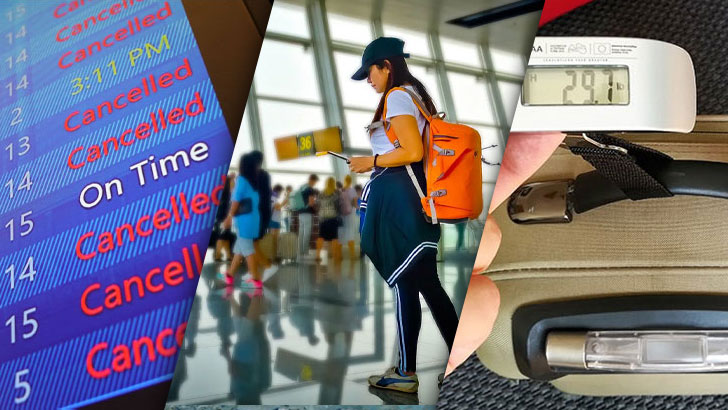 Regardless of how well you believe you have mastered your airport routine, it’s worth exploring these valuable insights to enhance your travel journey. While flying can sometimes be accompanied by unexpected hiccups, there are measures you can take to ensure a smoother journey.
Regardless of how well you believe you have mastered your airport routine, it’s worth exploring these valuable insights to enhance your travel journey. While flying can sometimes be accompanied by unexpected hiccups, there are measures you can take to ensure a smoother journey.
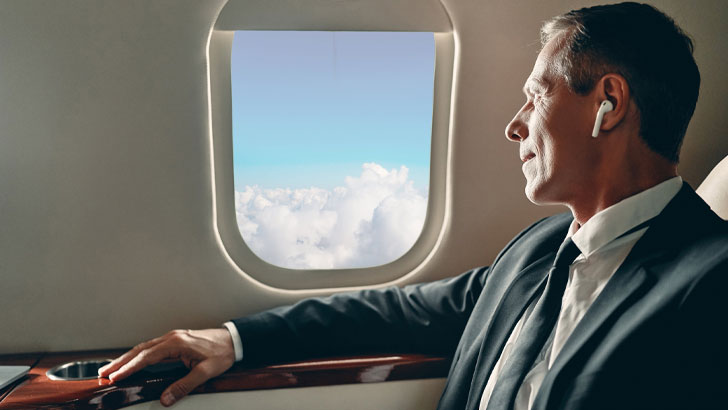 Bringing your own headphones to the airport is highly recommended for several reasons. Firstly, it saves you from the expense of purchasing a new set just for the in-flight entertainment. Additionally, using your own headphones ensures better comfort and prevents them from falling out of your ears unexpectedly.
Bringing your own headphones to the airport is highly recommended for several reasons. Firstly, it saves you from the expense of purchasing a new set just for the in-flight entertainment. Additionally, using your own headphones ensures better comfort and prevents them from falling out of your ears unexpectedly.
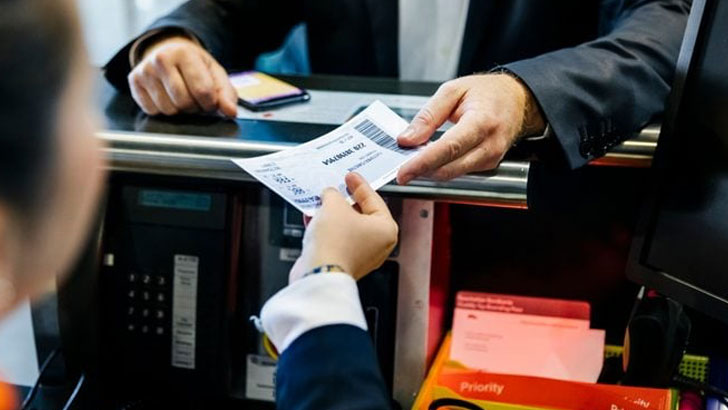 Don’t be hesitant to ask for a free upgrade when traveling. By confidently expressing that you’re celebrating a special occasion or simply hoping for a better seat, you may be surprised to receive a complimentary upgrade. While it doesn’t always work, there’s no harm in asking, and you might just end up with a more memorable experience.
Don’t be hesitant to ask for a free upgrade when traveling. By confidently expressing that you’re celebrating a special occasion or simply hoping for a better seat, you may be surprised to receive a complimentary upgrade. While it doesn’t always work, there’s no harm in asking, and you might just end up with a more memorable experience.
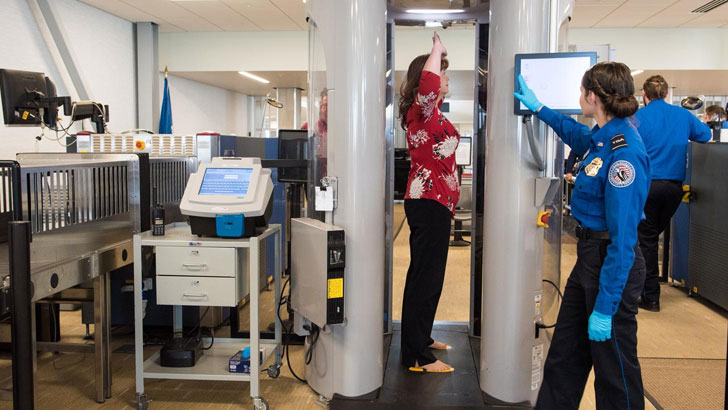 When going through airport security, consider heading to the left checkpoint instead of automatically going right. Most people are right-handed, so they naturally gravitate towards the right checkpoint. By going left, you can take advantage of shorter lines and potentially pass through security more quickly, saving valuable time.
When going through airport security, consider heading to the left checkpoint instead of automatically going right. Most people are right-handed, so they naturally gravitate towards the right checkpoint. By going left, you can take advantage of shorter lines and potentially pass through security more quickly, saving valuable time.
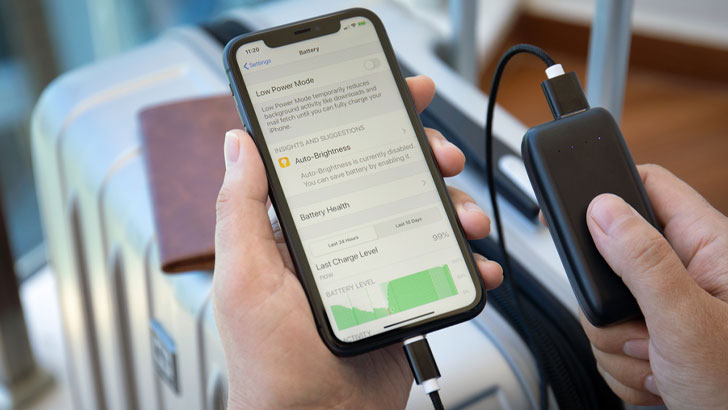 Don’t forget to bring a portable charger for your electronic devices. It’s essential to keep your tech gadgets charged during travel, especially when access to charging points may be limited. By having a portable charger, you can conveniently charge your devices whenever needed, ensuring you stay connected throughout your journey.
Don’t forget to bring a portable charger for your electronic devices. It’s essential to keep your tech gadgets charged during travel, especially when access to charging points may be limited. By having a portable charger, you can conveniently charge your devices whenever needed, ensuring you stay connected throughout your journey.
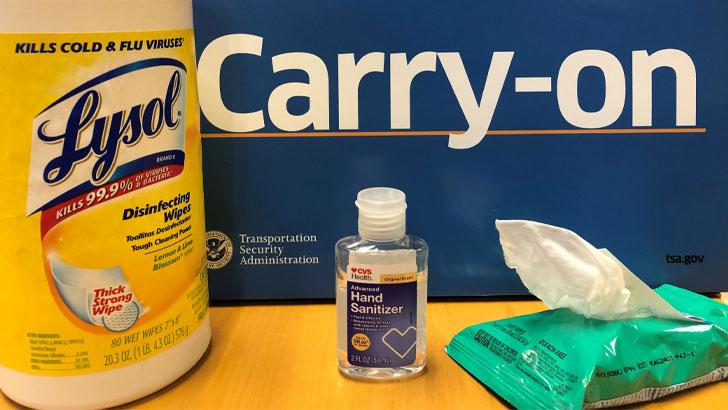 Traveling exposes you to various germs, so it’s wise to carry wet wipes and hand sanitizer. These items help protect you from potential illness and keep your hands clean. Use them frequently, especially during flights, and feel refreshed knowing you’re taking precautions to stay healthy.
Traveling exposes you to various germs, so it’s wise to carry wet wipes and hand sanitizer. These items help protect you from potential illness and keep your hands clean. Use them frequently, especially during flights, and feel refreshed knowing you’re taking precautions to stay healthy.
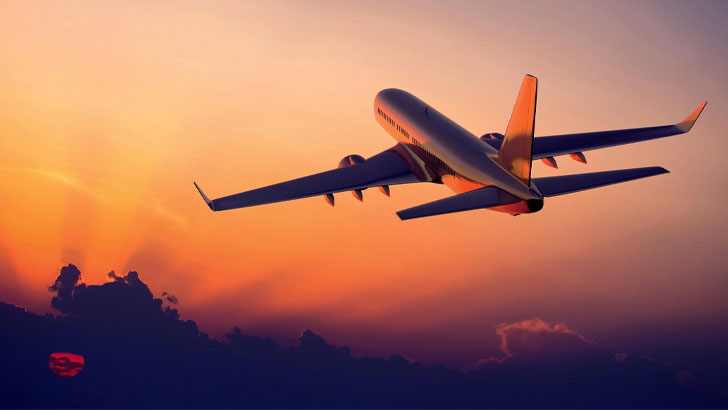 If you dislike turbulence during flights, consider booking an early morning flight. Turbulence is more common in the afternoon, so opting for a morning departure can increase the likelihood of a smoother and more relaxing flight experience.
If you dislike turbulence during flights, consider booking an early morning flight. Turbulence is more common in the afternoon, so opting for a morning departure can increase the likelihood of a smoother and more relaxing flight experience.
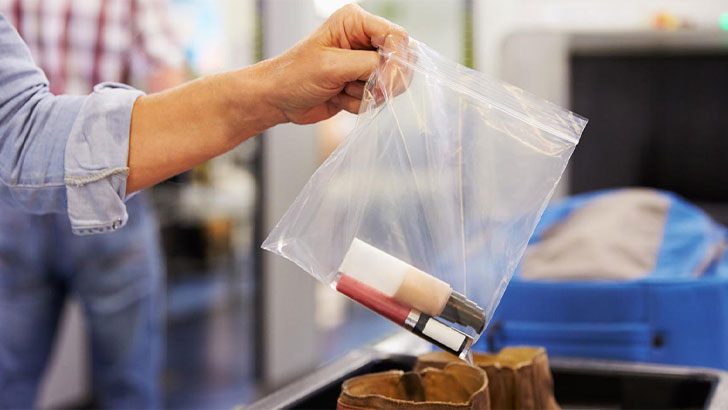 Pack spare Ziploc bags in your luggage. These versatile bags come in handy for various purposes, such as carrying liquids through security or protecting your belongings at the beach. Having them readily available can save you from last-minute purchases or potential damage to your items.
Pack spare Ziploc bags in your luggage. These versatile bags come in handy for various purposes, such as carrying liquids through security or protecting your belongings at the beach. Having them readily available can save you from last-minute purchases or potential damage to your items.
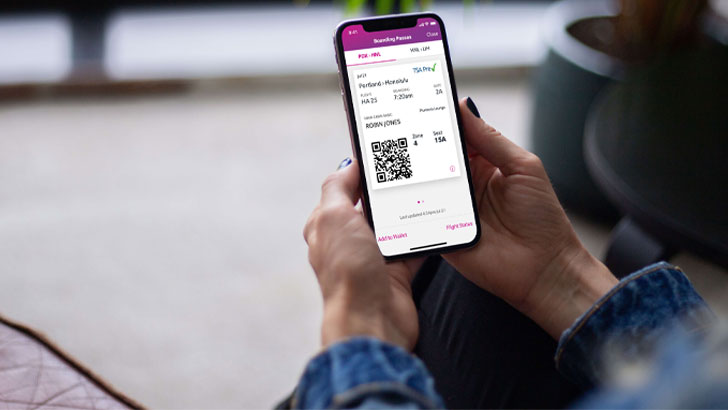 Take advantage of online check-in, available 24 hours before your flight. This convenient option allows you to skip the check-in line at the airport and proceed directly with your electronic boarding pass. Embrace this modern technology and enjoy a hassle-free start to your journey.
Take advantage of online check-in, available 24 hours before your flight. This convenient option allows you to skip the check-in line at the airport and proceed directly with your electronic boarding pass. Embrace this modern technology and enjoy a hassle-free start to your journey.
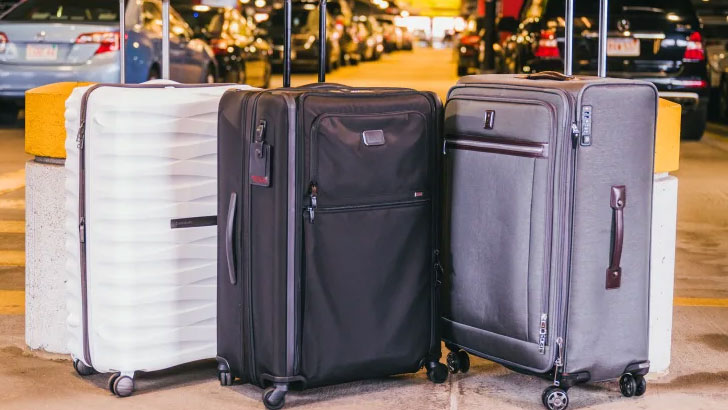 Capture a photo of your checked luggage before traveling. This helps you identify your bag more easily at the baggage claim area, preventing mix-ups and saving time. Even if you think you can recognize your bag, it’s better to have a photo reference for added certainty.
Capture a photo of your checked luggage before traveling. This helps you identify your bag more easily at the baggage claim area, preventing mix-ups and saving time. Even if you think you can recognize your bag, it’s better to have a photo reference for added certainty.
 Freeze your liquids before bringing them on a plane. With restrictions on carrying large amounts of liquid, freezing your water bottle or other beverages allows you to bring them through security. Ensure they remain completely frozen to comply with regulations and avoid wasting time and money.
Freeze your liquids before bringing them on a plane. With restrictions on carrying large amounts of liquid, freezing your water bottle or other beverages allows you to bring them through security. Ensure they remain completely frozen to comply with regulations and avoid wasting time and money.
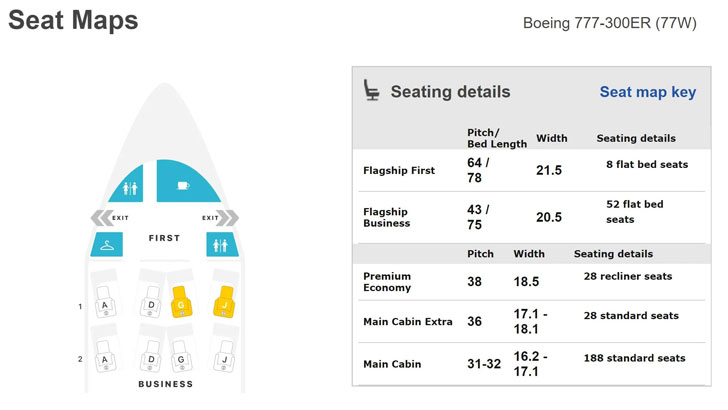 Use SeatGuru or similar tools to find the best seat on the plane when checking in. Different airlines have varying seat layouts, and SeatGuru provides helpful reviews and insights to help you choose a comfortable seat. Consider leaving your own review afterward to assist future travelers.
Use SeatGuru or similar tools to find the best seat on the plane when checking in. Different airlines have varying seat layouts, and SeatGuru provides helpful reviews and insights to help you choose a comfortable seat. Consider leaving your own review afterward to assist future travelers.
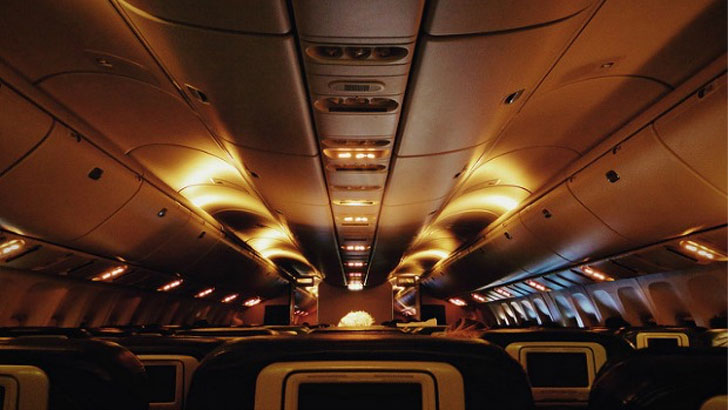 Consider booking a red-eye flight for a quieter and more peaceful travel experience. Although it may not be the preferred choice for many, red-eye flights departing late at night and arriving early in the morning offer a calmer atmosphere and less crowded airports. Utilize this option if you value a serene journey.
Consider booking a red-eye flight for a quieter and more peaceful travel experience. Although it may not be the preferred choice for many, red-eye flights departing late at night and arriving early in the morning offer a calmer atmosphere and less crowded airports. Utilize this option if you value a serene journey.
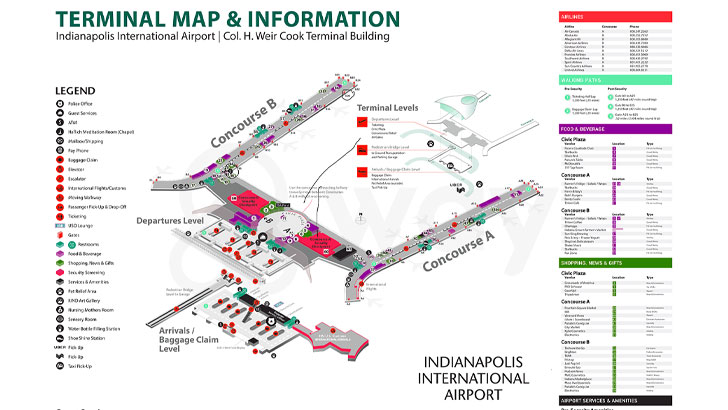 Research the available restaurants and shops at the airport before your trip. By checking ahead, you can plan your meals and ensure a better selection of quality dining options. Avoid settling for unhealthy fast food choices by being organized and making informed decisions.
Research the available restaurants and shops at the airport before your trip. By checking ahead, you can plan your meals and ensure a better selection of quality dining options. Avoid settling for unhealthy fast food choices by being organized and making informed decisions.
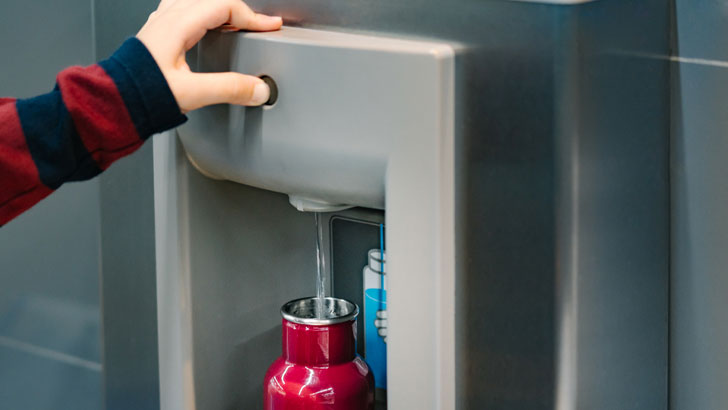 Bring an empty water bottle to the airport. Instead of purchasing expensive bottled water, you can fill up your own bottle after passing through security checkpoints. This simple action saves you money while keeping.
Bring an empty water bottle to the airport. Instead of purchasing expensive bottled water, you can fill up your own bottle after passing through security checkpoints. This simple action saves you money while keeping.
 Make it easier for your friends to find you in a crowded airport by wearing red clothing. A red scarf, coat, or hat can help you stand out and avoid getting separated from your travel companions. It’s a simple and effective way to stay connected.
Make it easier for your friends to find you in a crowded airport by wearing red clothing. A red scarf, coat, or hat can help you stand out and avoid getting separated from your travel companions. It’s a simple and effective way to stay connected.
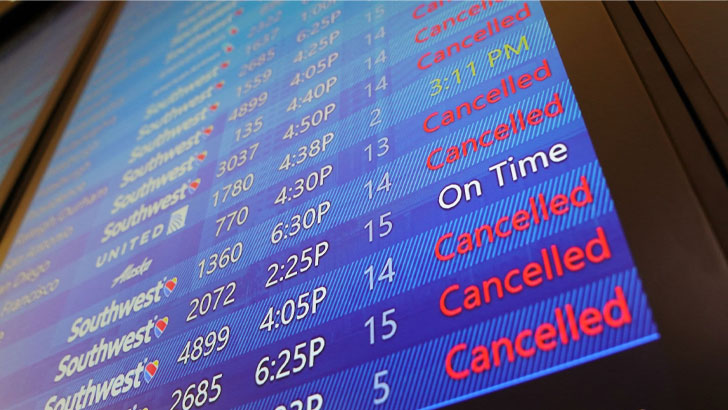 Avoid wasting time at the airport due to unexpected flight delays by checking your flight’s status online before you leave for the airport. This allows you to plan your arrival time accordingly and make necessary adjustments to your schedule.
Avoid wasting time at the airport due to unexpected flight delays by checking your flight’s status online before you leave for the airport. This allows you to plan your arrival time accordingly and make necessary adjustments to your schedule.
 Take advantage of the complimentary toiletries provided by hotels during your stay. Even if you don’t plan on using them immediately, keep them as they can serve as convenient travel-sized items for future trips. This helps you save money on purchasing travel-sized toiletries separately.
Take advantage of the complimentary toiletries provided by hotels during your stay. Even if you don’t plan on using them immediately, keep them as they can serve as convenient travel-sized items for future trips. This helps you save money on purchasing travel-sized toiletries separately.
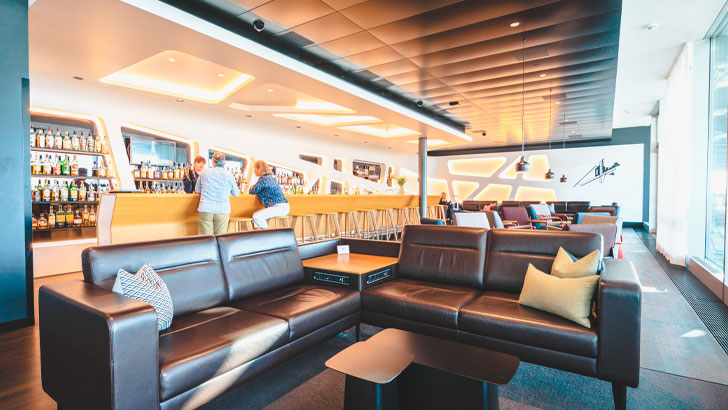 If you’re a frequent traveler or have accumulated frequent flier miles, consider exchanging them for VIP lounge access. These lounges offer a more comfortable and luxurious experience, with amenities such as comfortable seating, complimentary drinks, and entertainment. Alternatively, some airports offer day passes to their VIP lounges for a fee, providing a relaxing and enjoyable airport experience.
If you’re a frequent traveler or have accumulated frequent flier miles, consider exchanging them for VIP lounge access. These lounges offer a more comfortable and luxurious experience, with amenities such as comfortable seating, complimentary drinks, and entertainment. Alternatively, some airports offer day passes to their VIP lounges for a fee, providing a relaxing and enjoyable airport experience.
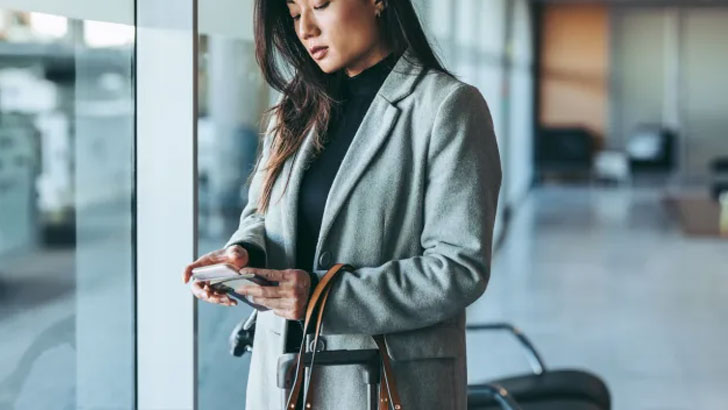 In the event of flight cancellations or delays, rather than joining the long line at the airport, call the airline’s customer service directly. The representatives over the phone have the same capabilities as those at the airport and can efficiently assist you with rebooking. This saves you time and eliminates the need to wait in line.
In the event of flight cancellations or delays, rather than joining the long line at the airport, call the airline’s customer service directly. The representatives over the phone have the same capabilities as those at the airport and can efficiently assist you with rebooking. This saves you time and eliminates the need to wait in line.
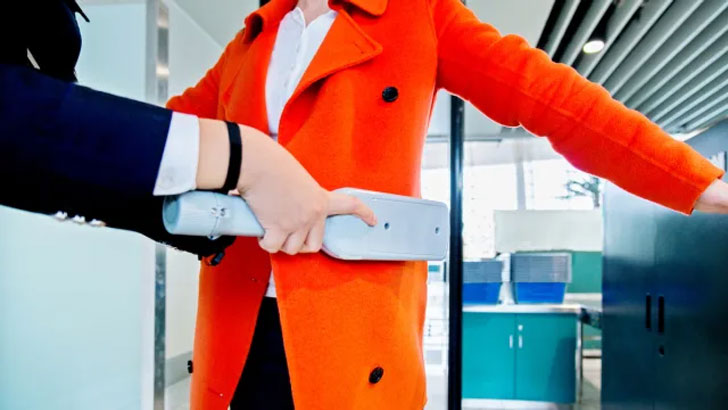 Minimize the chances of being selected for random security checks by opting for neutral-colored clothing instead of brightly colored ones. While not a guarantee, wearing neutral colors reduces the likelihood of attracting unnecessary attention during security screening.
Minimize the chances of being selected for random security checks by opting for neutral-colored clothing instead of brightly colored ones. While not a guarantee, wearing neutral colors reduces the likelihood of attracting unnecessary attention during security screening.
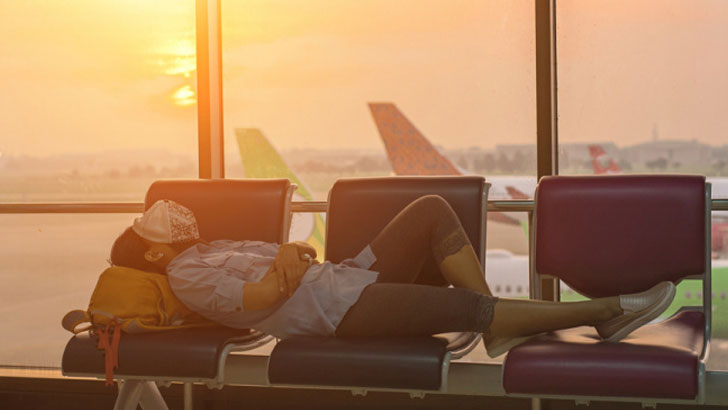 If your flight is delayed and you need some rest, find a quiet spot or consider renting a sleep pod if available. Some airports offer sleeping pods for rent, providing a more comfortable sleeping environment and access to facilities like showers. Taking a nap can help you recharge and make your wait more enjoyable.
If your flight is delayed and you need some rest, find a quiet spot or consider renting a sleep pod if available. Some airports offer sleeping pods for rent, providing a more comfortable sleeping environment and access to facilities like showers. Taking a nap can help you recharge and make your wait more enjoyable.
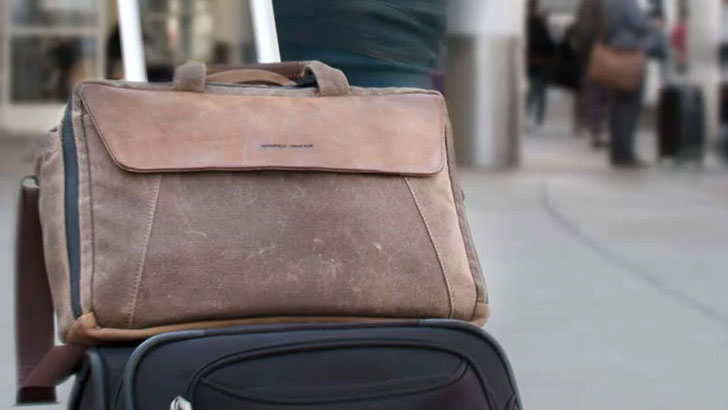 Invest in a laptop case or bag that allows easy access to your laptop during the flight. This eliminates the need to rummage through your bag to retrieve it, saving you time and hassle. Laptop cases are affordable and ensure your device is well-protected while being conveniently accessible.
Invest in a laptop case or bag that allows easy access to your laptop during the flight. This eliminates the need to rummage through your bag to retrieve it, saving you time and hassle. Laptop cases are affordable and ensure your device is well-protected while being conveniently accessible.
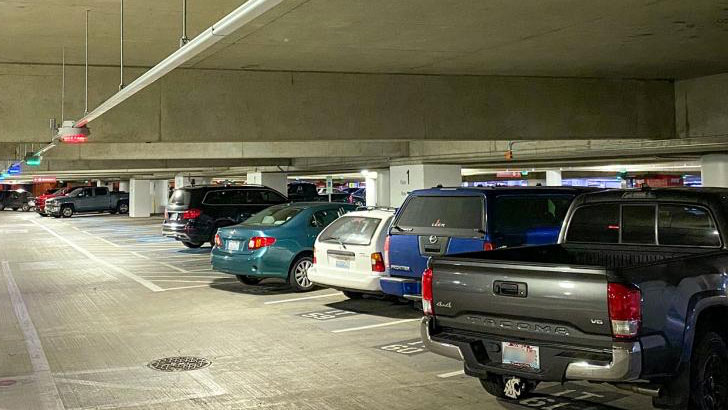 When parking at the airport, take a photo of your parking space to help you remember its location when you return. This simple trick prevents the frustration of searching for your car in a large parking lot, especially after a long and tiring journey.
When parking at the airport, take a photo of your parking space to help you remember its location when you return. This simple trick prevents the frustration of searching for your car in a large parking lot, especially after a long and tiring journey.
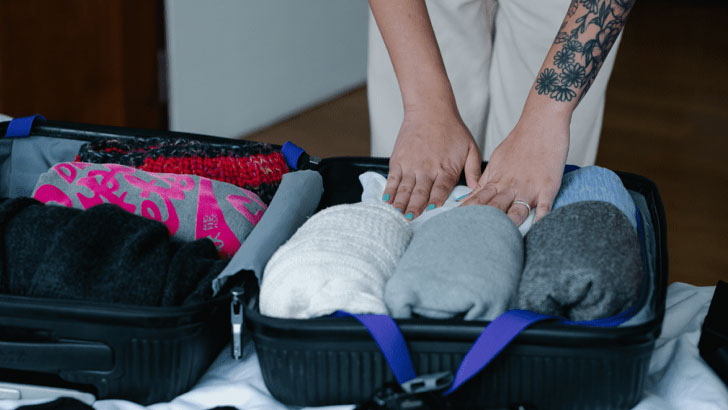 If you have extra items or are concerned about exceeding weight limits, consider wearing your bulkier clothing or accessories to the airport. This frees up space in your suitcase or carry-on and helps you avoid additional baggage fees. Once you pass through security, you can remove the extra layers and store them in your luggage.
If you have extra items or are concerned about exceeding weight limits, consider wearing your bulkier clothing or accessories to the airport. This frees up space in your suitcase or carry-on and helps you avoid additional baggage fees. Once you pass through security, you can remove the extra layers and store them in your luggage.
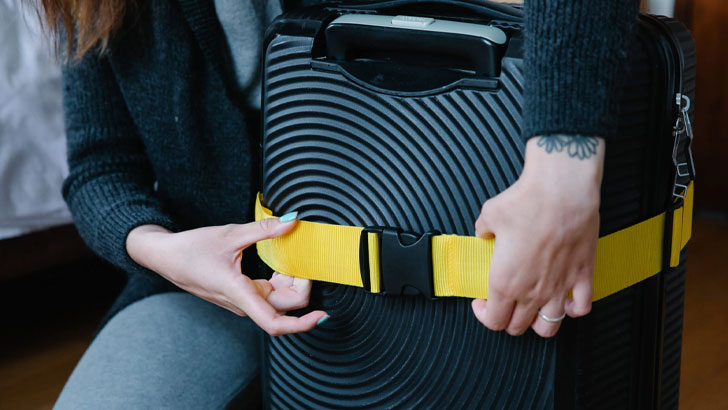 Avoid the hassle of identifying your bag by tying a bright scarf or tie to the handle. This simple trick allows you to spot your luggage easily and quickly move on to your destination.
Avoid the hassle of identifying your bag by tying a bright scarf or tie to the handle. This simple trick allows you to spot your luggage easily and quickly move on to your destination.
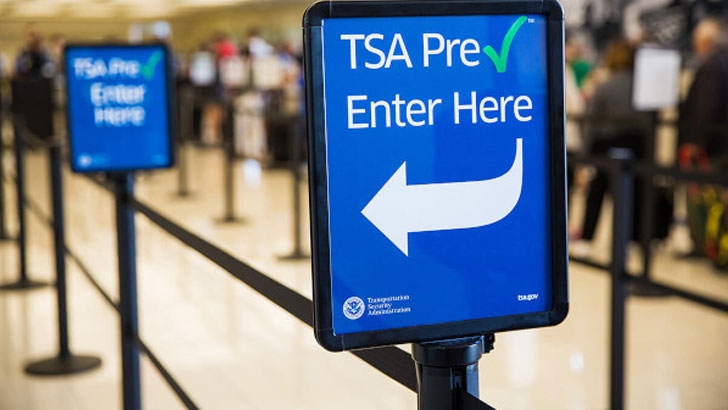 Save time and skip the long lines by applying for TSA Precheck or Global Entry. Though it may come at a cost, the convenience of bypassing the queues and reaching your destination faster is well worth it.
Save time and skip the long lines by applying for TSA Precheck or Global Entry. Though it may come at a cost, the convenience of bypassing the queues and reaching your destination faster is well worth it.
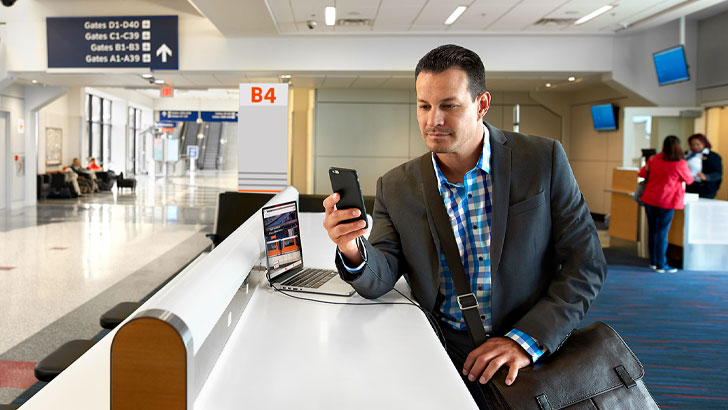 Avoid expensive data charges by checking if the airport offers free WiFi. Many airports, as well as restaurants within the terminal, provide complimentary WiFi access. Even if it’s not advertised, it’s worth asking around for a password or access code.
Avoid expensive data charges by checking if the airport offers free WiFi. Many airports, as well as restaurants within the terminal, provide complimentary WiFi access. Even if it’s not advertised, it’s worth asking around for a password or access code.
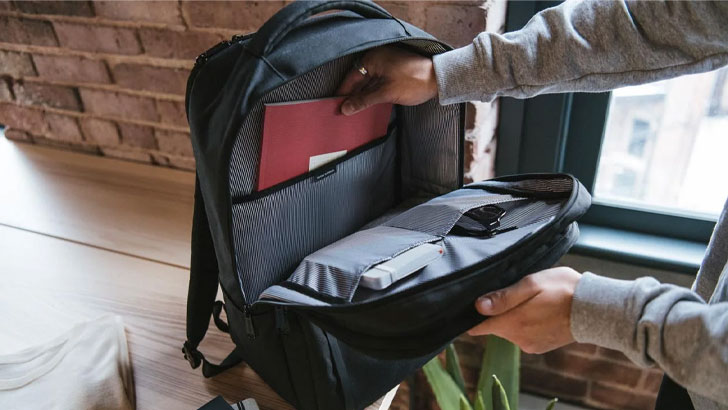 Streamline the security screening process by placing your liquids and electronic devices near the top of your carry-on bag. This way, you can easily access them when required without rummaging through your entire bag, saving time and minimizing inconvenience for others in line.
Streamline the security screening process by placing your liquids and electronic devices near the top of your carry-on bag. This way, you can easily access them when required without rummaging through your entire bag, saving time and minimizing inconvenience for others in line.
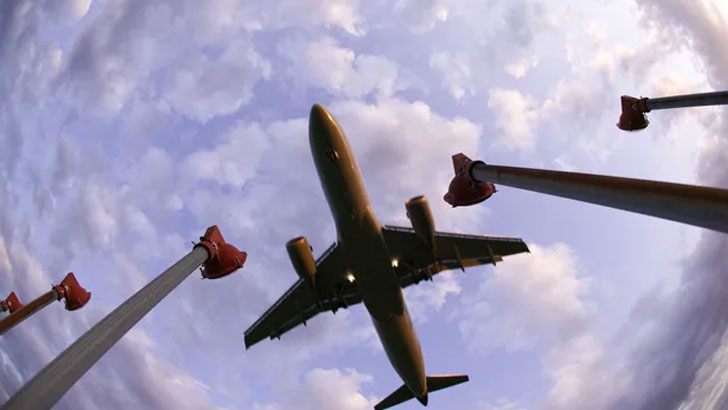 Save money on airfare by booking your flights on Tuesdays and Wednesdays. According to a study by CheapAir, these are the most cost-effective days to secure tickets, with potential savings averaging $73 per ticket. Additionally, consider traveling on Thursdays and Fridays for cheaper fares.
Save money on airfare by booking your flights on Tuesdays and Wednesdays. According to a study by CheapAir, these are the most cost-effective days to secure tickets, with potential savings averaging $73 per ticket. Additionally, consider traveling on Thursdays and Fridays for cheaper fares.
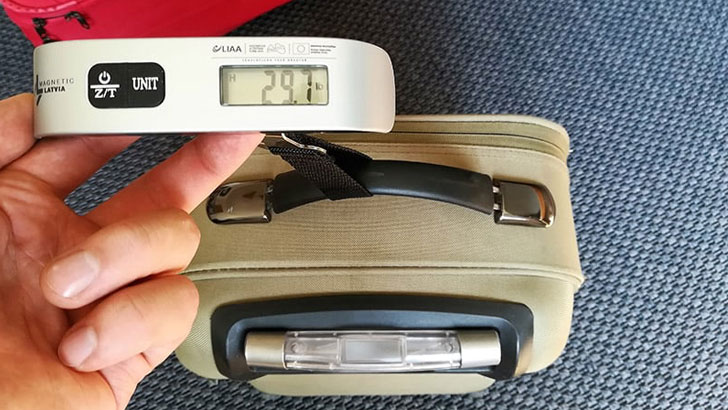 Avoid the frustration of discovering your bag is overweight by using a portable weight checker. Prior to heading to the airport, weigh your luggage at home to ensure it meets the weight limit. This is especially useful for frequent travelers who want to avoid additional charges.
Avoid the frustration of discovering your bag is overweight by using a portable weight checker. Prior to heading to the airport, weigh your luggage at home to ensure it meets the weight limit. This is especially useful for frequent travelers who want to avoid additional charges.
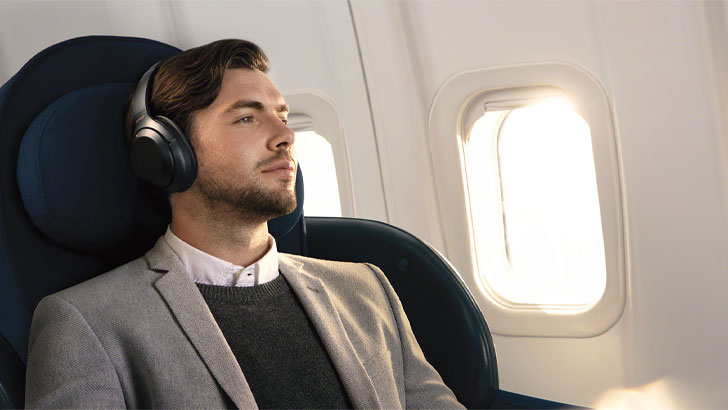 Although it’s tempting to drown out airport noise with music, it’s important to stay aware of important announcements. By keeping your ears open, you won’t miss crucial information such as flight updates, delay notifications, or offers for voluntary rebooking.
Although it’s tempting to drown out airport noise with music, it’s important to stay aware of important announcements. By keeping your ears open, you won’t miss crucial information such as flight updates, delay notifications, or offers for voluntary rebooking.
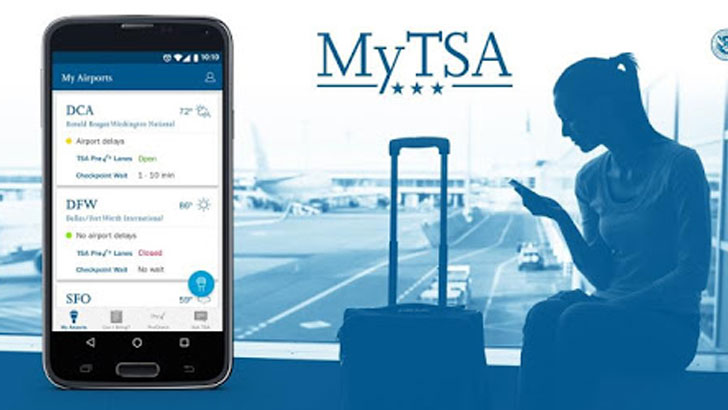 Instead of relying on guesswork, download the MyTSA app to access real-time security wait time information. This app, recognized as the “Best Government Mobile App” by the American Council for Technology, provides updates on wait times, traveler tips, and important news, enhancing your preparedness for the security screening process.
Instead of relying on guesswork, download the MyTSA app to access real-time security wait time information. This app, recognized as the “Best Government Mobile App” by the American Council for Technology, provides updates on wait times, traveler tips, and important news, enhancing your preparedness for the security screening process.
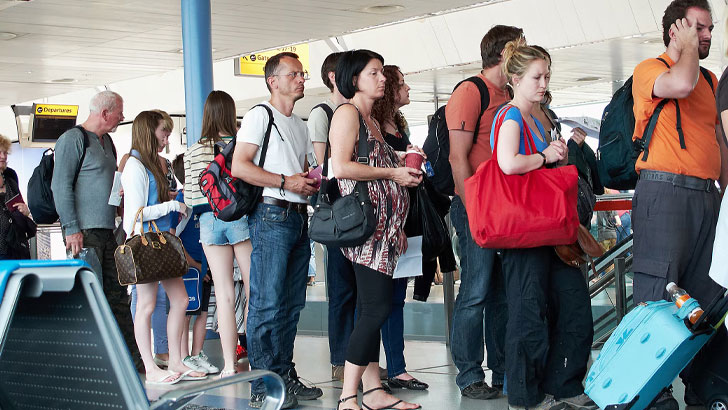 Unless you are running late for your flight, there’s no need to rush to board the plane. Remain calm and proceed to the boarding area when you feel ready. Remember, the plane won’t depart without you, so save yourself the stress and unnecessary frenzy.
Unless you are running late for your flight, there’s no need to rush to board the plane. Remain calm and proceed to the boarding area when you feel ready. Remember, the plane won’t depart without you, so save yourself the stress and unnecessary frenzy.
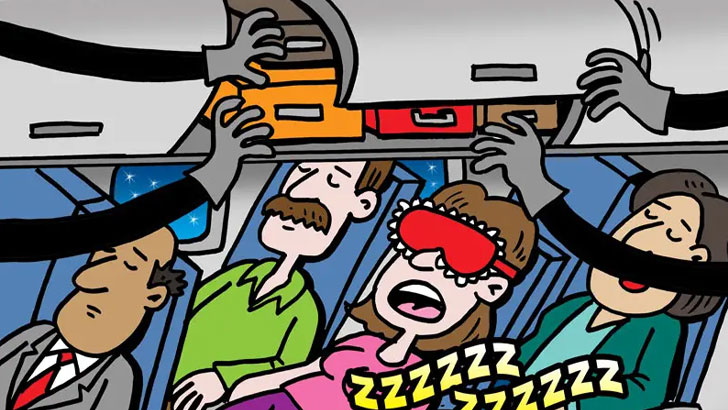 Protect your most important belongings by packing them in your carry-on bag. This ensures that even if your checked luggage gets lost or delayed, you’ll have essential items such as medications, chargers, important documents, toiletries, and valuables readily available.
Protect your most important belongings by packing them in your carry-on bag. This ensures that even if your checked luggage gets lost or delayed, you’ll have essential items such as medications, chargers, important documents, toiletries, and valuables readily available.
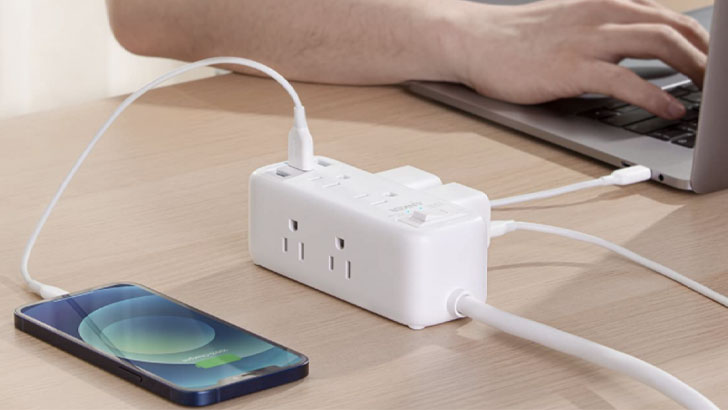 Overcome the challenge of limited power outlets by bringing a power strip with you. This allows you to charge multiple devices simultaneously, such as your phone, Airpods, laptop, and tablet. Additionally, you can consider sharing the outlets with fellow travelers, fostering a sense of goodwill.
Overcome the challenge of limited power outlets by bringing a power strip with you. This allows you to charge multiple devices simultaneously, such as your phone, Airpods, laptop, and tablet. Additionally, you can consider sharing the outlets with fellow travelers, fostering a sense of goodwill.
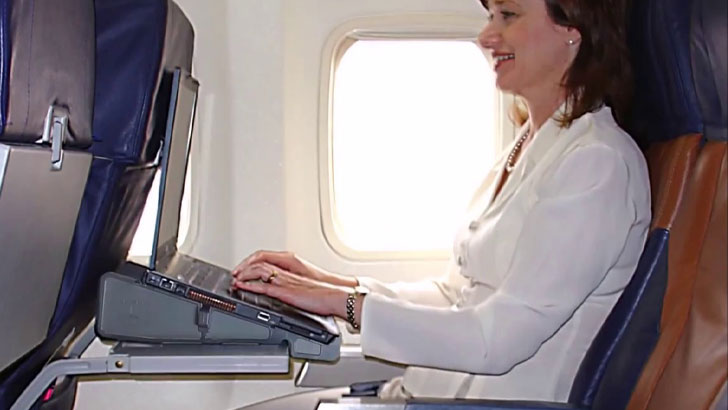 If you prefer working in a reclined position, invest in a laptop stand. This accessory provides a stable surface for your laptop while reclining, enabling you to comfortably work during your journey. Ensure to confirm with the passenger behind you before reclining your seat.
If you prefer working in a reclined position, invest in a laptop stand. This accessory provides a stable surface for your laptop while reclining, enabling you to comfortably work during your journey. Ensure to confirm with the passenger behind you before reclining your seat.
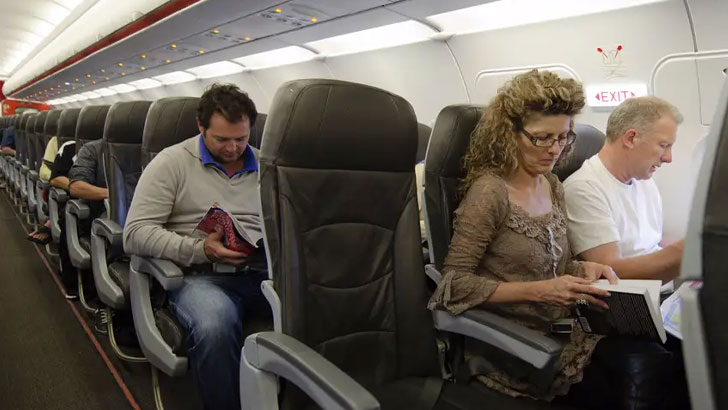 Sitting near the front of the plane offers several advantages, especially for those who are prone to motion sickness or discomfort during flights. Research shows that the center of gravity and pressure on a plane are located around the front area of the aircraft. By choosing a seat near the front, you can minimize the effects of flying that may make you feel sick or uncomfortable.
Sitting near the front of the plane offers several advantages, especially for those who are prone to motion sickness or discomfort during flights. Research shows that the center of gravity and pressure on a plane are located around the front area of the aircraft. By choosing a seat near the front, you can minimize the effects of flying that may make you feel sick or uncomfortable.
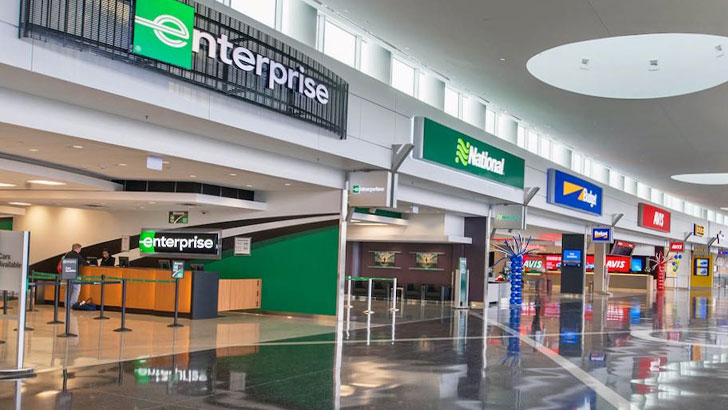 When traveling to a new destination, renting a car is often necessary. Instead of wasting time waiting in line at the rental counter, book your car online in advance. This not only provides you with better availability but can also save you money if you choose to prepay. By booking online, you have the opportunity to check for a car that fits your specific needs and budget before you even arrive at your destination.
When traveling to a new destination, renting a car is often necessary. Instead of wasting time waiting in line at the rental counter, book your car online in advance. This not only provides you with better availability but can also save you money if you choose to prepay. By booking online, you have the opportunity to check for a car that fits your specific needs and budget before you even arrive at your destination.
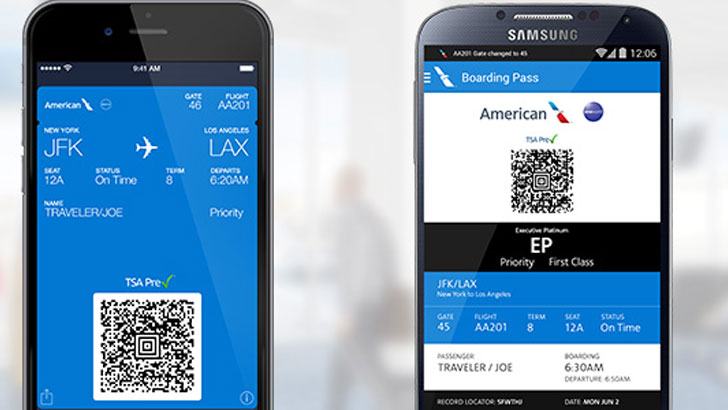 Save time and avoid confusion by downloading or printing your boarding pass and airport map ahead of time. Checking in early online, particularly with airlines like Southwest, can help secure a better boarding position. By having your boarding pass ready, you can skip the kiosk line at the airport and head straight to baggage check. Additionally, printing an airport map is beneficial, especially for navigating busy airports like LAX or ATL, which are known for their complexity.
Save time and avoid confusion by downloading or printing your boarding pass and airport map ahead of time. Checking in early online, particularly with airlines like Southwest, can help secure a better boarding position. By having your boarding pass ready, you can skip the kiosk line at the airport and head straight to baggage check. Additionally, printing an airport map is beneficial, especially for navigating busy airports like LAX or ATL, which are known for their complexity.
 If you wear contact lenses, consider switching to glasses for your flight. Flying can cause contact lenses to dry out and irritate your eyes due to reduced atmospheric pressure, oxygen, and humidity at high altitudes. To avoid discomfort and the need for constant eye drops, pack your glasses instead. Remember to pack your contact lens solution in your checked luggage, while keeping your glasses in your carry-on bag.
If you wear contact lenses, consider switching to glasses for your flight. Flying can cause contact lenses to dry out and irritate your eyes due to reduced atmospheric pressure, oxygen, and humidity at high altitudes. To avoid discomfort and the need for constant eye drops, pack your glasses instead. Remember to pack your contact lens solution in your checked luggage, while keeping your glasses in your carry-on bag.
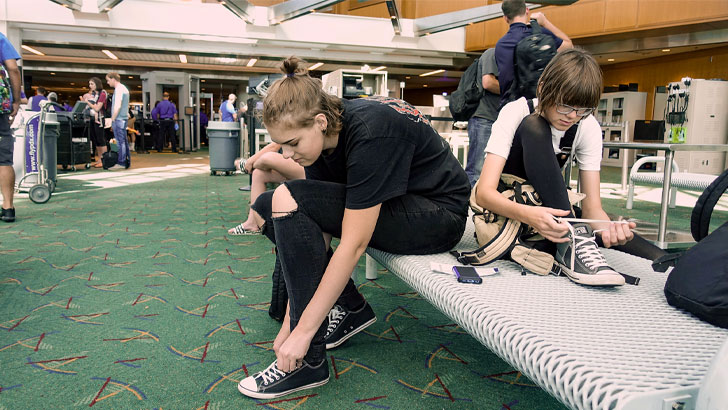 While it’s not advisable to walk around barefoot on a plane, wearing shoes with socks can provide comfort during long flights. If you anticipate a flight lasting eight hours or more, you can slip off your shoes and enjoy the journey in your socks. Many fellow passengers are likely to do the same, so you won’t feel out of place. Just remember to refrain from putting your feet up on the seat in front of you.
While it’s not advisable to walk around barefoot on a plane, wearing shoes with socks can provide comfort during long flights. If you anticipate a flight lasting eight hours or more, you can slip off your shoes and enjoy the journey in your socks. Many fellow passengers are likely to do the same, so you won’t feel out of place. Just remember to refrain from putting your feet up on the seat in front of you.
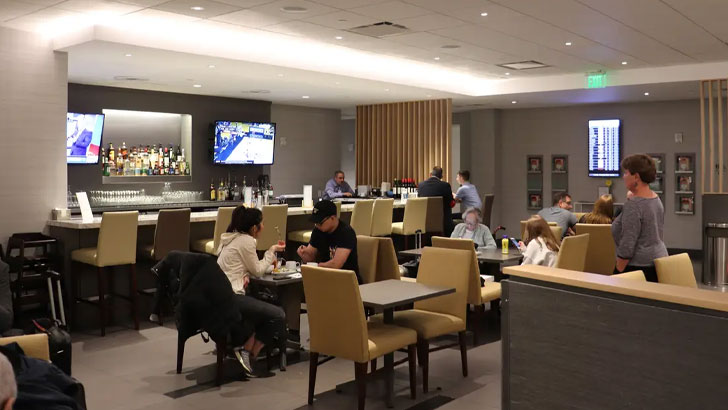 If you find yourself spending an extended period at the airport, purchasing an airport lounge pass can enhance your travel experience. Airport lounges offer comfortable seating, amenities like TVs and fast Wi-Fi, and sometimes even showers. These passes can be booked through the airline or third-party services such as LoungeBuddy, with prices ranging from $20 to $50.
If you find yourself spending an extended period at the airport, purchasing an airport lounge pass can enhance your travel experience. Airport lounges offer comfortable seating, amenities like TVs and fast Wi-Fi, and sometimes even showers. These passes can be booked through the airline or third-party services such as LoungeBuddy, with prices ranging from $20 to $50.
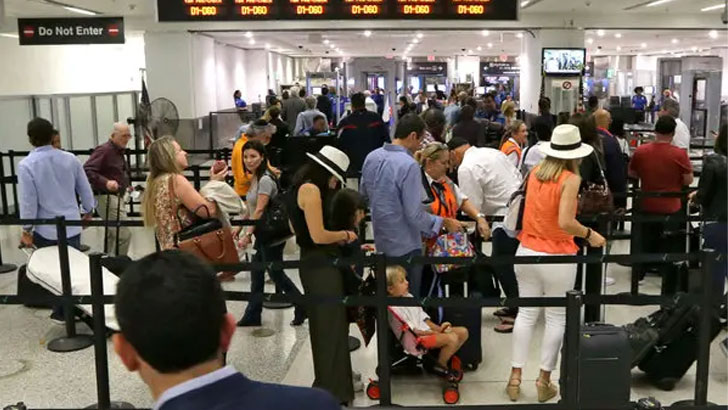 To streamline the security process and avoid frustrations, remember to empty your pockets before entering the security line. This simple action prevents delays caused by items triggering the scanner’s alert system. Even small objects like lint can set off the alarms, leading to additional screening and inconveniences. By emptying your pockets beforehand, you ensure a smoother and quicker passage through security.
To streamline the security process and avoid frustrations, remember to empty your pockets before entering the security line. This simple action prevents delays caused by items triggering the scanner’s alert system. Even small objects like lint can set off the alarms, leading to additional screening and inconveniences. By emptying your pockets beforehand, you ensure a smoother and quicker passage through security.
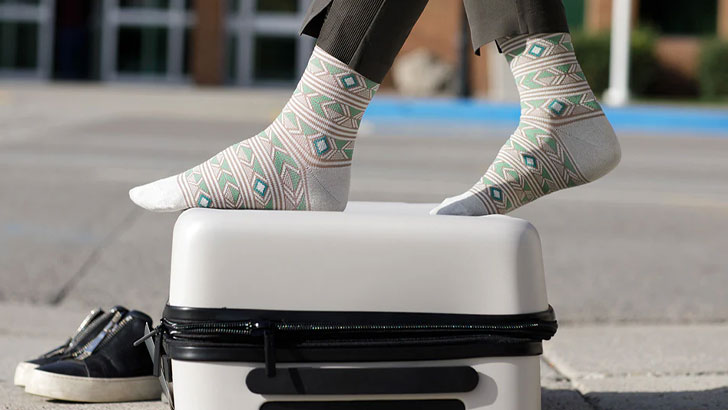 Compression socks can be a helpful tool in combating the effects of jet lag, especially during long flights. These socks help prevent blood from pooling in your feet and promote better circulation back to your heart. It is recommended to wear compression socks with a tightness of 30-40 mmHg (extra firm) for flights lasting more than five hours. This hack is particularly important to reduce the risk of swelling or conditions like deep vein thrombosis.
Compression socks can be a helpful tool in combating the effects of jet lag, especially during long flights. These socks help prevent blood from pooling in your feet and promote better circulation back to your heart. It is recommended to wear compression socks with a tightness of 30-40 mmHg (extra firm) for flights lasting more than five hours. This hack is particularly important to reduce the risk of swelling or conditions like deep vein thrombosis.
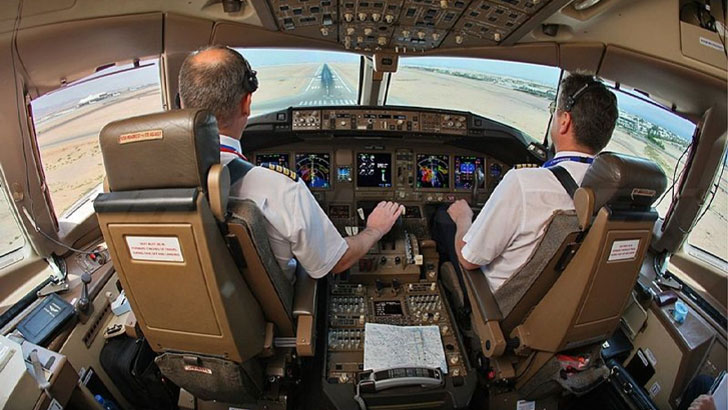 To save on ticket prices and avoid overcrowded airports, it’s best to avoid flying on the eve of major holidays such as Christmas, Thanksgiving, Easter, or the fourth of July. Generally these are the busiest times to travel, and not only are prices higher, but the amount of congestion in the airports, but flights becoming delayed put an even bigger hamper on holiday travel plans. It’s best to travel during the slow season to maximize time and price.
To save on ticket prices and avoid overcrowded airports, it’s best to avoid flying on the eve of major holidays such as Christmas, Thanksgiving, Easter, or the fourth of July. Generally these are the busiest times to travel, and not only are prices higher, but the amount of congestion in the airports, but flights becoming delayed put an even bigger hamper on holiday travel plans. It’s best to travel during the slow season to maximize time and price.
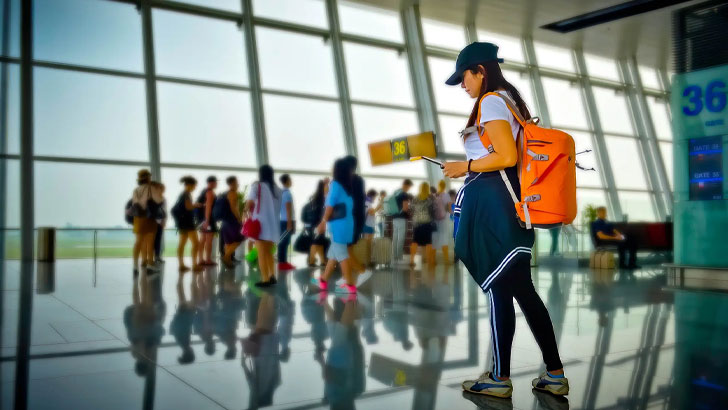 Choosing to board last on a plane can actually have its advantages. The Points Guy, a renowned travel hack guru, argues that boarding last is particularly beneficial on airlines with assigned seating. By being the last one on board, you can avoid the crowds and congestion in the jet bridge and gate area. This not only provides a more spacious and relaxed experience but also allows for better social distancing.
Choosing to board last on a plane can actually have its advantages. The Points Guy, a renowned travel hack guru, argues that boarding last is particularly beneficial on airlines with assigned seating. By being the last one on board, you can avoid the crowds and congestion in the jet bridge and gate area. This not only provides a more spacious and relaxed experience but also allows for better social distancing.
 Airport snacks can be exorbitantly priced, often costing three times more than what you would pay elsewhere. This is due to the higher operating costs of airports. To save money and avoid these inflated prices, a simple solution is to pack your own snacks. Treat the airport like a movie theater and bring your favorite snacks in your carry-on bag. Solid food items are typically allowed through the security scanners, although you may need to separate them from the rest of your belongings.
Airport snacks can be exorbitantly priced, often costing three times more than what you would pay elsewhere. This is due to the higher operating costs of airports. To save money and avoid these inflated prices, a simple solution is to pack your own snacks. Treat the airport like a movie theater and bring your favorite snacks in your carry-on bag. Solid food items are typically allowed through the security scanners, although you may need to separate them from the rest of your belongings.
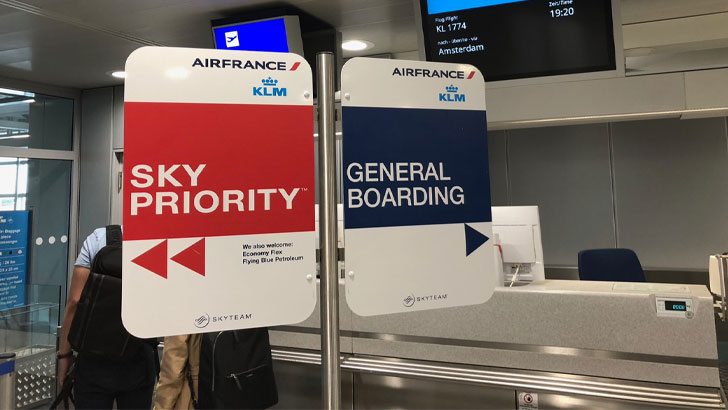 If you prefer not to board last, but still want to save time during the boarding process, try standing in line near the business class check-in area. Although you won’t be able to board unless you’re in business class, positioning yourself in this line will give you a favorable position when it’s time for your group to board.
If you prefer not to board last, but still want to save time during the boarding process, try standing in line near the business class check-in area. Although you won’t be able to board unless you’re in business class, positioning yourself in this line will give you a favorable position when it’s time for your group to board.
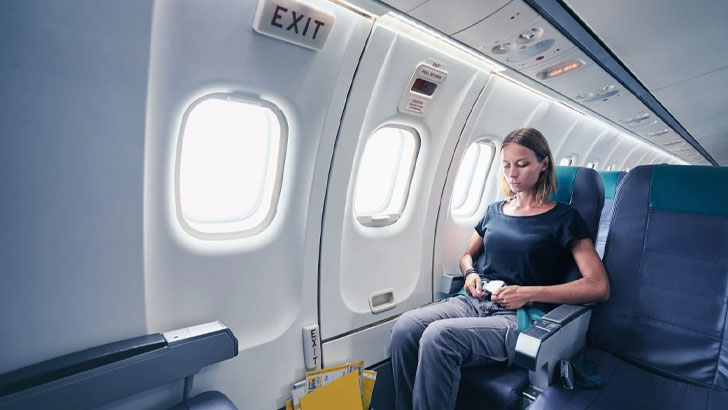 For those who are tall or prefer a quieter flight without children, selecting an exit row seat is a smart choice. These seats provide more legroom, which is especially valuable on long-haul flights. The second row of exit seats, in particular, offers ample space and reclining capabilities. Additionally, children are not allowed to sit in these seats, ensuring a more peaceful journey.
For those who are tall or prefer a quieter flight without children, selecting an exit row seat is a smart choice. These seats provide more legroom, which is especially valuable on long-haul flights. The second row of exit seats, in particular, offers ample space and reclining capabilities. Additionally, children are not allowed to sit in these seats, ensuring a more peaceful journey.
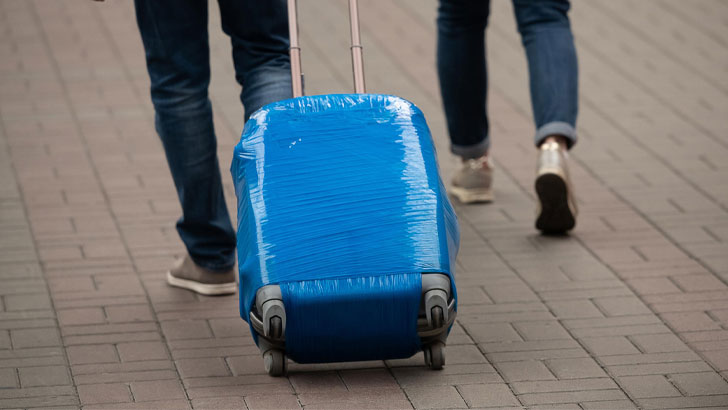 To protect your luggage from scratches and dents, consider shrink-wrapping it or using a luggage cover. In 2017, approximately 22 million pieces of luggage were mishandled and returned to their owners in damaged conditions. Shrink-wrapping your luggage is permitted and will still allow it to pass through security scanners. If shrink-wrapping seems too labor-intensive, you can purchase a luggage cover, such as a clear PVC suitcase cover.
To protect your luggage from scratches and dents, consider shrink-wrapping it or using a luggage cover. In 2017, approximately 22 million pieces of luggage were mishandled and returned to their owners in damaged conditions. Shrink-wrapping your luggage is permitted and will still allow it to pass through security scanners. If shrink-wrapping seems too labor-intensive, you can purchase a luggage cover, such as a clear PVC suitcase cover.
 Regardless of how well you believe you have mastered your airport routine, it’s worth exploring these valuable insights to enhance your travel journey. While flying can sometimes be accompanied by unexpected hiccups, there are measures you can take to ensure a smoother journey.
Regardless of how well you believe you have mastered your airport routine, it’s worth exploring these valuable insights to enhance your travel journey. While flying can sometimes be accompanied by unexpected hiccups, there are measures you can take to ensure a smoother journey.
Bring Headphones
 Bringing your own headphones to the airport is highly recommended for several reasons. Firstly, it saves you from the expense of purchasing a new set just for the in-flight entertainment. Additionally, using your own headphones ensures better comfort and prevents them from falling out of your ears unexpectedly.
Bringing your own headphones to the airport is highly recommended for several reasons. Firstly, it saves you from the expense of purchasing a new set just for the in-flight entertainment. Additionally, using your own headphones ensures better comfort and prevents them from falling out of your ears unexpectedly.
Ask For Upgrades
 Don’t be hesitant to ask for a free upgrade when traveling. By confidently expressing that you’re celebrating a special occasion or simply hoping for a better seat, you may be surprised to receive a complimentary upgrade. While it doesn’t always work, there’s no harm in asking, and you might just end up with a more memorable experience.
Don’t be hesitant to ask for a free upgrade when traveling. By confidently expressing that you’re celebrating a special occasion or simply hoping for a better seat, you may be surprised to receive a complimentary upgrade. While it doesn’t always work, there’s no harm in asking, and you might just end up with a more memorable experience.
Left Security Checkpoint
 When going through airport security, consider heading to the left checkpoint instead of automatically going right. Most people are right-handed, so they naturally gravitate towards the right checkpoint. By going left, you can take advantage of shorter lines and potentially pass through security more quickly, saving valuable time.
When going through airport security, consider heading to the left checkpoint instead of automatically going right. Most people are right-handed, so they naturally gravitate towards the right checkpoint. By going left, you can take advantage of shorter lines and potentially pass through security more quickly, saving valuable time.
Bring Portable Charger
 Don’t forget to bring a portable charger for your electronic devices. It’s essential to keep your tech gadgets charged during travel, especially when access to charging points may be limited. By having a portable charger, you can conveniently charge your devices whenever needed, ensuring you stay connected throughout your journey.
Don’t forget to bring a portable charger for your electronic devices. It’s essential to keep your tech gadgets charged during travel, especially when access to charging points may be limited. By having a portable charger, you can conveniently charge your devices whenever needed, ensuring you stay connected throughout your journey.
Bring Sanitation
 Traveling exposes you to various germs, so it’s wise to carry wet wipes and hand sanitizer. These items help protect you from potential illness and keep your hands clean. Use them frequently, especially during flights, and feel refreshed knowing you’re taking precautions to stay healthy.
Traveling exposes you to various germs, so it’s wise to carry wet wipes and hand sanitizer. These items help protect you from potential illness and keep your hands clean. Use them frequently, especially during flights, and feel refreshed knowing you’re taking precautions to stay healthy.
Book Morning To Avoid Turbulence
 If you dislike turbulence during flights, consider booking an early morning flight. Turbulence is more common in the afternoon, so opting for a morning departure can increase the likelihood of a smoother and more relaxing flight experience.
If you dislike turbulence during flights, consider booking an early morning flight. Turbulence is more common in the afternoon, so opting for a morning departure can increase the likelihood of a smoother and more relaxing flight experience.
Use Ziplocs
 Pack spare Ziploc bags in your luggage. These versatile bags come in handy for various purposes, such as carrying liquids through security or protecting your belongings at the beach. Having them readily available can save you from last-minute purchases or potential damage to your items.
Pack spare Ziploc bags in your luggage. These versatile bags come in handy for various purposes, such as carrying liquids through security or protecting your belongings at the beach. Having them readily available can save you from last-minute purchases or potential damage to your items.
Check In 24 Hours Prior
 Take advantage of online check-in, available 24 hours before your flight. This convenient option allows you to skip the check-in line at the airport and proceed directly with your electronic boarding pass. Embrace this modern technology and enjoy a hassle-free start to your journey.
Take advantage of online check-in, available 24 hours before your flight. This convenient option allows you to skip the check-in line at the airport and proceed directly with your electronic boarding pass. Embrace this modern technology and enjoy a hassle-free start to your journey.
Take Photo Of Checked Luggage
 Capture a photo of your checked luggage before traveling. This helps you identify your bag more easily at the baggage claim area, preventing mix-ups and saving time. Even if you think you can recognize your bag, it’s better to have a photo reference for added certainty.
Capture a photo of your checked luggage before traveling. This helps you identify your bag more easily at the baggage claim area, preventing mix-ups and saving time. Even if you think you can recognize your bag, it’s better to have a photo reference for added certainty.
Freeze Liquids
 Freeze your liquids before bringing them on a plane. With restrictions on carrying large amounts of liquid, freezing your water bottle or other beverages allows you to bring them through security. Ensure they remain completely frozen to comply with regulations and avoid wasting time and money.
Freeze your liquids before bringing them on a plane. With restrictions on carrying large amounts of liquid, freezing your water bottle or other beverages allows you to bring them through security. Ensure they remain completely frozen to comply with regulations and avoid wasting time and money.
Research Best Seats
 Use SeatGuru or similar tools to find the best seat on the plane when checking in. Different airlines have varying seat layouts, and SeatGuru provides helpful reviews and insights to help you choose a comfortable seat. Consider leaving your own review afterward to assist future travelers.
Use SeatGuru or similar tools to find the best seat on the plane when checking in. Different airlines have varying seat layouts, and SeatGuru provides helpful reviews and insights to help you choose a comfortable seat. Consider leaving your own review afterward to assist future travelers.
Take Red-Eyes
 Consider booking a red-eye flight for a quieter and more peaceful travel experience. Although it may not be the preferred choice for many, red-eye flights departing late at night and arriving early in the morning offer a calmer atmosphere and less crowded airports. Utilize this option if you value a serene journey.
Consider booking a red-eye flight for a quieter and more peaceful travel experience. Although it may not be the preferred choice for many, red-eye flights departing late at night and arriving early in the morning offer a calmer atmosphere and less crowded airports. Utilize this option if you value a serene journey.
Research Airports Ahead
 Research the available restaurants and shops at the airport before your trip. By checking ahead, you can plan your meals and ensure a better selection of quality dining options. Avoid settling for unhealthy fast food choices by being organized and making informed decisions.
Research the available restaurants and shops at the airport before your trip. By checking ahead, you can plan your meals and ensure a better selection of quality dining options. Avoid settling for unhealthy fast food choices by being organized and making informed decisions.
Bring Empty Water Bottle
 Bring an empty water bottle to the airport. Instead of purchasing expensive bottled water, you can fill up your own bottle after passing through security checkpoints. This simple action saves you money while keeping.
Bring an empty water bottle to the airport. Instead of purchasing expensive bottled water, you can fill up your own bottle after passing through security checkpoints. This simple action saves you money while keeping.
Wear Red
 Make it easier for your friends to find you in a crowded airport by wearing red clothing. A red scarf, coat, or hat can help you stand out and avoid getting separated from your travel companions. It’s a simple and effective way to stay connected.
Make it easier for your friends to find you in a crowded airport by wearing red clothing. A red scarf, coat, or hat can help you stand out and avoid getting separated from your travel companions. It’s a simple and effective way to stay connected.
Monitor Flight Status
 Avoid wasting time at the airport due to unexpected flight delays by checking your flight’s status online before you leave for the airport. This allows you to plan your arrival time accordingly and make necessary adjustments to your schedule.
Avoid wasting time at the airport due to unexpected flight delays by checking your flight’s status online before you leave for the airport. This allows you to plan your arrival time accordingly and make necessary adjustments to your schedule.
Take Hotel Toiletries
 Take advantage of the complimentary toiletries provided by hotels during your stay. Even if you don’t plan on using them immediately, keep them as they can serve as convenient travel-sized items for future trips. This helps you save money on purchasing travel-sized toiletries separately.
Take advantage of the complimentary toiletries provided by hotels during your stay. Even if you don’t plan on using them immediately, keep them as they can serve as convenient travel-sized items for future trips. This helps you save money on purchasing travel-sized toiletries separately.
Sign Up For VIP Lounges
 If you’re a frequent traveler or have accumulated frequent flier miles, consider exchanging them for VIP lounge access. These lounges offer a more comfortable and luxurious experience, with amenities such as comfortable seating, complimentary drinks, and entertainment. Alternatively, some airports offer day passes to their VIP lounges for a fee, providing a relaxing and enjoyable airport experience.
If you’re a frequent traveler or have accumulated frequent flier miles, consider exchanging them for VIP lounge access. These lounges offer a more comfortable and luxurious experience, with amenities such as comfortable seating, complimentary drinks, and entertainment. Alternatively, some airports offer day passes to their VIP lounges for a fee, providing a relaxing and enjoyable airport experience.
Call When Flight Is Canceled
 In the event of flight cancellations or delays, rather than joining the long line at the airport, call the airline’s customer service directly. The representatives over the phone have the same capabilities as those at the airport and can efficiently assist you with rebooking. This saves you time and eliminates the need to wait in line.
In the event of flight cancellations or delays, rather than joining the long line at the airport, call the airline’s customer service directly. The representatives over the phone have the same capabilities as those at the airport and can efficiently assist you with rebooking. This saves you time and eliminates the need to wait in line.
Avoid Bright Clothing
 Minimize the chances of being selected for random security checks by opting for neutral-colored clothing instead of brightly colored ones. While not a guarantee, wearing neutral colors reduces the likelihood of attracting unnecessary attention during security screening.
Minimize the chances of being selected for random security checks by opting for neutral-colored clothing instead of brightly colored ones. While not a guarantee, wearing neutral colors reduces the likelihood of attracting unnecessary attention during security screening.
Nap While Waiting
 If your flight is delayed and you need some rest, find a quiet spot or consider renting a sleep pod if available. Some airports offer sleeping pods for rent, providing a more comfortable sleeping environment and access to facilities like showers. Taking a nap can help you recharge and make your wait more enjoyable.
If your flight is delayed and you need some rest, find a quiet spot or consider renting a sleep pod if available. Some airports offer sleeping pods for rent, providing a more comfortable sleeping environment and access to facilities like showers. Taking a nap can help you recharge and make your wait more enjoyable.
Get a Laptop-Friendly Bag
 Invest in a laptop case or bag that allows easy access to your laptop during the flight. This eliminates the need to rummage through your bag to retrieve it, saving you time and hassle. Laptop cases are affordable and ensure your device is well-protected while being conveniently accessible.
Invest in a laptop case or bag that allows easy access to your laptop during the flight. This eliminates the need to rummage through your bag to retrieve it, saving you time and hassle. Laptop cases are affordable and ensure your device is well-protected while being conveniently accessible.
Take A Photo Of Your Parking Space
 When parking at the airport, take a photo of your parking space to help you remember its location when you return. This simple trick prevents the frustration of searching for your car in a large parking lot, especially after a long and tiring journey.
When parking at the airport, take a photo of your parking space to help you remember its location when you return. This simple trick prevents the frustration of searching for your car in a large parking lot, especially after a long and tiring journey.
Wear Extra Luggage
 If you have extra items or are concerned about exceeding weight limits, consider wearing your bulkier clothing or accessories to the airport. This frees up space in your suitcase or carry-on and helps you avoid additional baggage fees. Once you pass through security, you can remove the extra layers and store them in your luggage.
If you have extra items or are concerned about exceeding weight limits, consider wearing your bulkier clothing or accessories to the airport. This frees up space in your suitcase or carry-on and helps you avoid additional baggage fees. Once you pass through security, you can remove the extra layers and store them in your luggage.
Wrap Your Bags
 Avoid the hassle of identifying your bag by tying a bright scarf or tie to the handle. This simple trick allows you to spot your luggage easily and quickly move on to your destination.
Avoid the hassle of identifying your bag by tying a bright scarf or tie to the handle. This simple trick allows you to spot your luggage easily and quickly move on to your destination.
Get TSA Pre-Check
 Save time and skip the long lines by applying for TSA Precheck or Global Entry. Though it may come at a cost, the convenience of bypassing the queues and reaching your destination faster is well worth it.
Save time and skip the long lines by applying for TSA Precheck or Global Entry. Though it may come at a cost, the convenience of bypassing the queues and reaching your destination faster is well worth it.
Check For Wi-Fi
 Avoid expensive data charges by checking if the airport offers free WiFi. Many airports, as well as restaurants within the terminal, provide complimentary WiFi access. Even if it’s not advertised, it’s worth asking around for a password or access code.
Avoid expensive data charges by checking if the airport offers free WiFi. Many airports, as well as restaurants within the terminal, provide complimentary WiFi access. Even if it’s not advertised, it’s worth asking around for a password or access code.
Liquids & Electronics On Top
 Streamline the security screening process by placing your liquids and electronic devices near the top of your carry-on bag. This way, you can easily access them when required without rummaging through your entire bag, saving time and minimizing inconvenience for others in line.
Streamline the security screening process by placing your liquids and electronic devices near the top of your carry-on bag. This way, you can easily access them when required without rummaging through your entire bag, saving time and minimizing inconvenience for others in line.
Book Tuesdays & Wednesdays
 Save money on airfare by booking your flights on Tuesdays and Wednesdays. According to a study by CheapAir, these are the most cost-effective days to secure tickets, with potential savings averaging $73 per ticket. Additionally, consider traveling on Thursdays and Fridays for cheaper fares.
Save money on airfare by booking your flights on Tuesdays and Wednesdays. According to a study by CheapAir, these are the most cost-effective days to secure tickets, with potential savings averaging $73 per ticket. Additionally, consider traveling on Thursdays and Fridays for cheaper fares.
Get Weight Checker
 Avoid the frustration of discovering your bag is overweight by using a portable weight checker. Prior to heading to the airport, weigh your luggage at home to ensure it meets the weight limit. This is especially useful for frequent travelers who want to avoid additional charges.
Avoid the frustration of discovering your bag is overweight by using a portable weight checker. Prior to heading to the airport, weigh your luggage at home to ensure it meets the weight limit. This is especially useful for frequent travelers who want to avoid additional charges.
Keep Music Low
 Although it’s tempting to drown out airport noise with music, it’s important to stay aware of important announcements. By keeping your ears open, you won’t miss crucial information such as flight updates, delay notifications, or offers for voluntary rebooking.
Although it’s tempting to drown out airport noise with music, it’s important to stay aware of important announcements. By keeping your ears open, you won’t miss crucial information such as flight updates, delay notifications, or offers for voluntary rebooking.
Use TSA App
 Instead of relying on guesswork, download the MyTSA app to access real-time security wait time information. This app, recognized as the “Best Government Mobile App” by the American Council for Technology, provides updates on wait times, traveler tips, and important news, enhancing your preparedness for the security screening process.
Instead of relying on guesswork, download the MyTSA app to access real-time security wait time information. This app, recognized as the “Best Government Mobile App” by the American Council for Technology, provides updates on wait times, traveler tips, and important news, enhancing your preparedness for the security screening process.
Don’t Rush To Onboard
 Unless you are running late for your flight, there’s no need to rush to board the plane. Remain calm and proceed to the boarding area when you feel ready. Remember, the plane won’t depart without you, so save yourself the stress and unnecessary frenzy.
Unless you are running late for your flight, there’s no need to rush to board the plane. Remain calm and proceed to the boarding area when you feel ready. Remember, the plane won’t depart without you, so save yourself the stress and unnecessary frenzy.
Keep Important Items On You
 Protect your most important belongings by packing them in your carry-on bag. This ensures that even if your checked luggage gets lost or delayed, you’ll have essential items such as medications, chargers, important documents, toiletries, and valuables readily available.
Protect your most important belongings by packing them in your carry-on bag. This ensures that even if your checked luggage gets lost or delayed, you’ll have essential items such as medications, chargers, important documents, toiletries, and valuables readily available.
Carry A Power Strip
 Overcome the challenge of limited power outlets by bringing a power strip with you. This allows you to charge multiple devices simultaneously, such as your phone, Airpods, laptop, and tablet. Additionally, you can consider sharing the outlets with fellow travelers, fostering a sense of goodwill.
Overcome the challenge of limited power outlets by bringing a power strip with you. This allows you to charge multiple devices simultaneously, such as your phone, Airpods, laptop, and tablet. Additionally, you can consider sharing the outlets with fellow travelers, fostering a sense of goodwill.
Buy Laptop Stand
 If you prefer working in a reclined position, invest in a laptop stand. This accessory provides a stable surface for your laptop while reclining, enabling you to comfortably work during your journey. Ensure to confirm with the passenger behind you before reclining your seat.
If you prefer working in a reclined position, invest in a laptop stand. This accessory provides a stable surface for your laptop while reclining, enabling you to comfortably work during your journey. Ensure to confirm with the passenger behind you before reclining your seat.
Sit In The Front
 Sitting near the front of the plane offers several advantages, especially for those who are prone to motion sickness or discomfort during flights. Research shows that the center of gravity and pressure on a plane are located around the front area of the aircraft. By choosing a seat near the front, you can minimize the effects of flying that may make you feel sick or uncomfortable.
Sitting near the front of the plane offers several advantages, especially for those who are prone to motion sickness or discomfort during flights. Research shows that the center of gravity and pressure on a plane are located around the front area of the aircraft. By choosing a seat near the front, you can minimize the effects of flying that may make you feel sick or uncomfortable.
Rent Car Beforehand
 When traveling to a new destination, renting a car is often necessary. Instead of wasting time waiting in line at the rental counter, book your car online in advance. This not only provides you with better availability but can also save you money if you choose to prepay. By booking online, you have the opportunity to check for a car that fits your specific needs and budget before you even arrive at your destination.
When traveling to a new destination, renting a car is often necessary. Instead of wasting time waiting in line at the rental counter, book your car online in advance. This not only provides you with better availability but can also save you money if you choose to prepay. By booking online, you have the opportunity to check for a car that fits your specific needs and budget before you even arrive at your destination.
Download Boarding Pass
 Save time and avoid confusion by downloading or printing your boarding pass and airport map ahead of time. Checking in early online, particularly with airlines like Southwest, can help secure a better boarding position. By having your boarding pass ready, you can skip the kiosk line at the airport and head straight to baggage check. Additionally, printing an airport map is beneficial, especially for navigating busy airports like LAX or ATL, which are known for their complexity.
Save time and avoid confusion by downloading or printing your boarding pass and airport map ahead of time. Checking in early online, particularly with airlines like Southwest, can help secure a better boarding position. By having your boarding pass ready, you can skip the kiosk line at the airport and head straight to baggage check. Additionally, printing an airport map is beneficial, especially for navigating busy airports like LAX or ATL, which are known for their complexity.
Wear Contacts
 If you wear contact lenses, consider switching to glasses for your flight. Flying can cause contact lenses to dry out and irritate your eyes due to reduced atmospheric pressure, oxygen, and humidity at high altitudes. To avoid discomfort and the need for constant eye drops, pack your glasses instead. Remember to pack your contact lens solution in your checked luggage, while keeping your glasses in your carry-on bag.
If you wear contact lenses, consider switching to glasses for your flight. Flying can cause contact lenses to dry out and irritate your eyes due to reduced atmospheric pressure, oxygen, and humidity at high altitudes. To avoid discomfort and the need for constant eye drops, pack your glasses instead. Remember to pack your contact lens solution in your checked luggage, while keeping your glasses in your carry-on bag.
Wear Shoes And Socks
 While it’s not advisable to walk around barefoot on a plane, wearing shoes with socks can provide comfort during long flights. If you anticipate a flight lasting eight hours or more, you can slip off your shoes and enjoy the journey in your socks. Many fellow passengers are likely to do the same, so you won’t feel out of place. Just remember to refrain from putting your feet up on the seat in front of you.
While it’s not advisable to walk around barefoot on a plane, wearing shoes with socks can provide comfort during long flights. If you anticipate a flight lasting eight hours or more, you can slip off your shoes and enjoy the journey in your socks. Many fellow passengers are likely to do the same, so you won’t feel out of place. Just remember to refrain from putting your feet up on the seat in front of you.
Buy Lounge Day Pass
 If you find yourself spending an extended period at the airport, purchasing an airport lounge pass can enhance your travel experience. Airport lounges offer comfortable seating, amenities like TVs and fast Wi-Fi, and sometimes even showers. These passes can be booked through the airline or third-party services such as LoungeBuddy, with prices ranging from $20 to $50.
If you find yourself spending an extended period at the airport, purchasing an airport lounge pass can enhance your travel experience. Airport lounges offer comfortable seating, amenities like TVs and fast Wi-Fi, and sometimes even showers. These passes can be booked through the airline or third-party services such as LoungeBuddy, with prices ranging from $20 to $50.
Empty Pockets Before Security
 To streamline the security process and avoid frustrations, remember to empty your pockets before entering the security line. This simple action prevents delays caused by items triggering the scanner’s alert system. Even small objects like lint can set off the alarms, leading to additional screening and inconveniences. By emptying your pockets beforehand, you ensure a smoother and quicker passage through security.
To streamline the security process and avoid frustrations, remember to empty your pockets before entering the security line. This simple action prevents delays caused by items triggering the scanner’s alert system. Even small objects like lint can set off the alarms, leading to additional screening and inconveniences. By emptying your pockets beforehand, you ensure a smoother and quicker passage through security.
Wear Compression Socks
 Compression socks can be a helpful tool in combating the effects of jet lag, especially during long flights. These socks help prevent blood from pooling in your feet and promote better circulation back to your heart. It is recommended to wear compression socks with a tightness of 30-40 mmHg (extra firm) for flights lasting more than five hours. This hack is particularly important to reduce the risk of swelling or conditions like deep vein thrombosis.
Compression socks can be a helpful tool in combating the effects of jet lag, especially during long flights. These socks help prevent blood from pooling in your feet and promote better circulation back to your heart. It is recommended to wear compression socks with a tightness of 30-40 mmHg (extra firm) for flights lasting more than five hours. This hack is particularly important to reduce the risk of swelling or conditions like deep vein thrombosis.
Don’t Fly Holidays
 To save on ticket prices and avoid overcrowded airports, it’s best to avoid flying on the eve of major holidays such as Christmas, Thanksgiving, Easter, or the fourth of July. Generally these are the busiest times to travel, and not only are prices higher, but the amount of congestion in the airports, but flights becoming delayed put an even bigger hamper on holiday travel plans. It’s best to travel during the slow season to maximize time and price.
To save on ticket prices and avoid overcrowded airports, it’s best to avoid flying on the eve of major holidays such as Christmas, Thanksgiving, Easter, or the fourth of July. Generally these are the busiest times to travel, and not only are prices higher, but the amount of congestion in the airports, but flights becoming delayed put an even bigger hamper on holiday travel plans. It’s best to travel during the slow season to maximize time and price.
Board Last
 Choosing to board last on a plane can actually have its advantages. The Points Guy, a renowned travel hack guru, argues that boarding last is particularly beneficial on airlines with assigned seating. By being the last one on board, you can avoid the crowds and congestion in the jet bridge and gate area. This not only provides a more spacious and relaxed experience but also allows for better social distancing.
Choosing to board last on a plane can actually have its advantages. The Points Guy, a renowned travel hack guru, argues that boarding last is particularly beneficial on airlines with assigned seating. By being the last one on board, you can avoid the crowds and congestion in the jet bridge and gate area. This not only provides a more spacious and relaxed experience but also allows for better social distancing.
Pack Your Own Snacks
 Airport snacks can be exorbitantly priced, often costing three times more than what you would pay elsewhere. This is due to the higher operating costs of airports. To save money and avoid these inflated prices, a simple solution is to pack your own snacks. Treat the airport like a movie theater and bring your favorite snacks in your carry-on bag. Solid food items are typically allowed through the security scanners, although you may need to separate them from the rest of your belongings.
Airport snacks can be exorbitantly priced, often costing three times more than what you would pay elsewhere. This is due to the higher operating costs of airports. To save money and avoid these inflated prices, a simple solution is to pack your own snacks. Treat the airport like a movie theater and bring your favorite snacks in your carry-on bag. Solid food items are typically allowed through the security scanners, although you may need to separate them from the rest of your belongings.
Stand Near Business Class
 If you prefer not to board last, but still want to save time during the boarding process, try standing in line near the business class check-in area. Although you won’t be able to board unless you’re in business class, positioning yourself in this line will give you a favorable position when it’s time for your group to board.
If you prefer not to board last, but still want to save time during the boarding process, try standing in line near the business class check-in area. Although you won’t be able to board unless you’re in business class, positioning yourself in this line will give you a favorable position when it’s time for your group to board.
Utilize Emergency Exit Seat
 For those who are tall or prefer a quieter flight without children, selecting an exit row seat is a smart choice. These seats provide more legroom, which is especially valuable on long-haul flights. The second row of exit seats, in particular, offers ample space and reclining capabilities. Additionally, children are not allowed to sit in these seats, ensuring a more peaceful journey.
For those who are tall or prefer a quieter flight without children, selecting an exit row seat is a smart choice. These seats provide more legroom, which is especially valuable on long-haul flights. The second row of exit seats, in particular, offers ample space and reclining capabilities. Additionally, children are not allowed to sit in these seats, ensuring a more peaceful journey.
Shrink-Wrap Luggage
 To protect your luggage from scratches and dents, consider shrink-wrapping it or using a luggage cover. In 2017, approximately 22 million pieces of luggage were mishandled and returned to their owners in damaged conditions. Shrink-wrapping your luggage is permitted and will still allow it to pass through security scanners. If shrink-wrapping seems too labor-intensive, you can purchase a luggage cover, such as a clear PVC suitcase cover.
To protect your luggage from scratches and dents, consider shrink-wrapping it or using a luggage cover. In 2017, approximately 22 million pieces of luggage were mishandled and returned to their owners in damaged conditions. Shrink-wrapping your luggage is permitted and will still allow it to pass through security scanners. If shrink-wrapping seems too labor-intensive, you can purchase a luggage cover, such as a clear PVC suitcase cover.
More From Financially+
-


Biggest Draft Busts In Sports History
-


The Worst Neighbors In The World
-


The Largest Athletes In Sports History
-


Popular Brands That Aren’t American
-


Brand Names Disguised As Costco’s Kirkland Signature Products
-
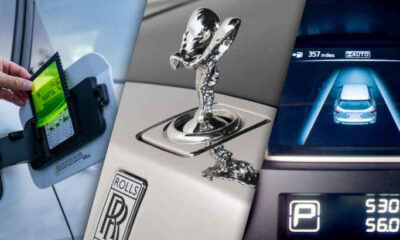

Hidden Car Features You Didn’t Know Existed
-


25 Prospect Cities For The NFL
-


Celebs Living With Chronic Conditions
-


Historic Titanic Photos
